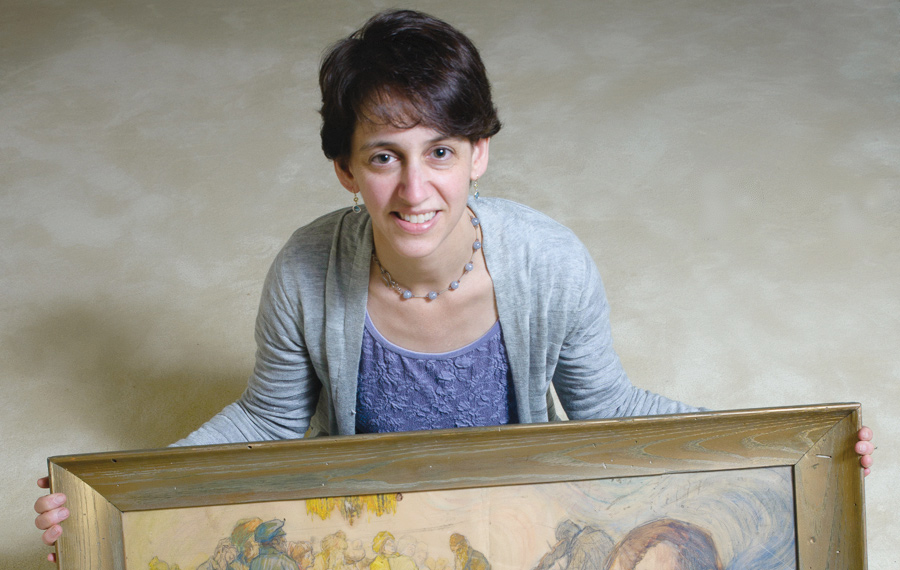 Elizabeth Rynecki; Photo by Shoey Sindel Photography
Elizabeth Rynecki; Photo by Shoey Sindel Photography Elizabeth Rynecki’s great-grandfather Moshe, a Polish Jew, was a renowned artist who was murdered in 1943 at the Majdanek concentration camp. His family has recovered more than 100 of his paintings since the war, but many more pieces are missing. The quest to locate Moshe’s lost art has been Rynecki’s mission for longer than a decade, and it’s the subject of her first film, “Chasing Portraits.”
Moshe’s vivid, expressionistic paintings depict Polish Jews at prayer, work and leisure, preserving on canvas a world that no longer exists. Painted between World War I and World War II, “They’re frozen in the moment, with no premonition of the Holocaust to come,” Rynecki told the Journal.
Although she did not bear witness to the Holocaust as her grandparents and father did, she said, “I knew the paintings were survivors and they had a voice that needed to be heard. I had an obligation to tell the story. That’s what has driven me forward.”
Her project began in 1999, when she built a website for Moshe’s art and discovered more paintings existed. “Chasing Portraits” was filmed during a 10-year period between 2008 and 2018; in the interim, Rynecki wrote a book of the same name, published by Penguin Random House in 2016. “Having the book in place gave me more credibility, and it helped me raise the funds I needed to finish the film,” she said.
As seen in the documentary, Rynecki made several trips overseas to view Moshe’s paintings. The Jewish Historical Institute in Warsaw has 52 of them, and Yad Vashem in Israel has one the family donated, entitled “Refugees.” While in Poland, Rynecki made a difficult visit to Majdanek. “I felt an obligation to go, but I was really hesitant about filming there,” she said. “I wanted to make sure it was respectful. Ultimately, we included it, without narration.”
Rynecki also tracked down private collectors, one of whom gave her a painting she’s fairly certain is a forgery. “There’s an increased interest in Jewish art in Poland and people are selling copies, trying to capitalize on that,” she said. “It doesn’t matter to me if it’s not an original because this man had a desire to do what he could to help heal those wounds a little bit. That, to me, was so meaningful.”
She had quite a different experience with a woman in Israel who has Moshe’s paintings but refuses to let Rynecki see them. “The family gave me photographs of the paintings but they’re really bad. It’s not the same. For me, there’s a visceral connection to the paintings,” she said. “I want to see them in person.”
Although the situation is frustrating to her, taking legal action to reclaim the art is problematic, if not impossible. Rynecki lacks the sales receipts, insurance documents and inventory lists that would serve as proof. She also knows Moshe sold, gave away and bartered his paintings, and she wouldn’t have rights to those. Private collectors aren’t subject to guidelines about Holocaust-era art the way museums are. Filing would be very costly because each disputed painting would require a separate claim.
In addition, copyright protection ends 70 years after the death of the artist, so Moshe’s paintings no longer are covered. Rynecki discovered counterfeit paintings on a Chinese website, ordered them and wrote “MADE IN CHINA” on the back. “Three generations from now, I don’t want people to think they’re real,” she said.
“Although she did not bear witness to the Holocaust as her grandparents and father did, she said, “I knew the paintings were survivors and they had a voice that needed to be heard.”
Although there won’t be a famous court battle in her future like the one in the movie “The Woman in Gold,” “I’m really grateful for [the movie] and ‘Monuments Men’ because they brought attention to Holocaust-era looted art and gave the topic a lot of publicity,” Rynecki said. She has come to believe there can be historical justice without legal justice.
“Would it be fantastic to have another Rynecki painting in my possession? Absolutely. And if anyone has one and doesn’t want it, I will take it,” she said. “But every time an audience sees the film, they see the paintings and know his story, and that, to me, is 100 times more important than having another painting in my possession. Artists want their work to be seen, and my hoarding them doesn’t accomplish that goal.”
Raised in a Reform Jewish home in the San Francisco Bay area, where she runs her family’s commercial real estate company and lives with her husband and two sons, Rynecki is not religious. “I’m more of a food and culture Jew,” she said. “I feel
like this project is my connection to the Jewish world.”
Making the documentary has given her some closure, “but it will never quite end, because there’s always the hope that somebody else will step forward,” she said. “I do believe there are more paintings out there and I’m hoping as the story spreads, people may realize they have a painting, step forward and allow me to see it if they know I’m not going to sue them for it.”
As for the bigger-picture impact, “I hope that it inspires people to dig into their own family histories,” Rynecki said. “We all come from somewhere, and that influences and impacts who we are. Just asking those questions and having a better sense of that is so important.”
“Chasing Portraits” opens at the Laemmle Music Hall, 9036 Wilshire Blvd., Beverly Hills on May 17. Elizabeth Rynecki will participate in several Q&A sessions opening weekend. Visit Laemmle.com for information.






















 More news and opinions than at a Shabbat dinner, right in your inbox.
More news and opinions than at a Shabbat dinner, right in your inbox.